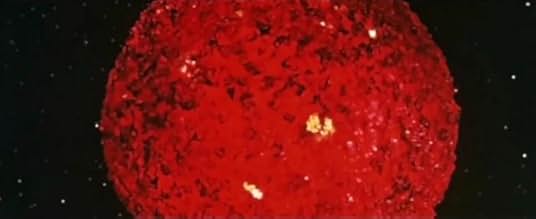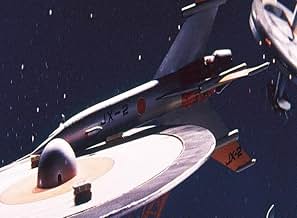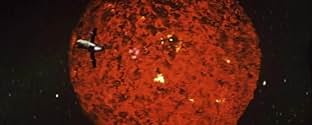A Tokyo scientist and his colleagues shift Earth to avoid a red-hot planet on a collision course.A Tokyo scientist and his colleagues shift Earth to avoid a red-hot planet on a collision course.A Tokyo scientist and his colleagues shift Earth to avoid a red-hot planet on a collision course.
- Director
- Writers
- Stars
- Director
- Writers
- All cast & crew
- Production, box office & more at IMDbPro
5.7996
1
2
3
4
5
6
7
8
9
10
Featured reviews
A Classic From The Golden Age of Toho
This film is one of my favorites from Toho's "Golden Age" and one of the three "space operas" directed by Ishiro Honda. A giant asteroid with a huge magnetic field is growing by absorbing everything in its path...a path which puts it on a course to Earth. How will man survive? Easy---through the conviction and determination of Japanese will-power and ingenuity, the Earth is pushed out of orbit after giant engines are built at the South Pole. But is it enough to get the Earth out of the path of Gorath?
One scene that most Americans have never seen is the appearance of MAGMA, a giant prehistoric walrus which was awakened by the heat generated at the South Pole by the massive engines. After some initial destruction, the monster is killed by beams fired from a VTOL vehicle (which would see a new life in the TV series, "Ultraman" as the "Jet Beetle.")
Kumi Mizuno shines as one of the female leads with a great bathtub scene when Akira Kubo comes knocking on her door.
One scene that most Americans have never seen is the appearance of MAGMA, a giant prehistoric walrus which was awakened by the heat generated at the South Pole by the massive engines. After some initial destruction, the monster is killed by beams fired from a VTOL vehicle (which would see a new life in the TV series, "Ultraman" as the "Jet Beetle.")
Kumi Mizuno shines as one of the female leads with a great bathtub scene when Akira Kubo comes knocking on her door.
When Worlds Collide-Japanese Style
This Japanese take on the kind of story first pioneered by "When Worlds Collide" and done less effectively in later years in "Meteor", "Armageddon" etc. has been called Toho's greatest sci-fi movie ever by some. It's certainly a fairly intelligent effort overall, done with top of the line (for its time) FX. I was glad to see it in its original Japanese format, widescreen with subtitles (and with the rather pointless scene involving giant walrus Magma) and found it quite entertaining overall, certainly the equal of "When Worlds Collide" and light years ahead of the American takes on the story that followed. My only quibble was why Gorath was referred to as a "star", when it is clearly too small to be so categorized, and should have been referred to as a runaway planet (was Toho afraid of getting sued for ripping off "When Worlds Collide" if they categorized it as a planet?).
Fans of the wonderful 1960 disaster movie "The Last Voyage" will recognize George Furness, who played Third Officer Osborne in that film, as the UN Secretary-General. Furness was a lawyer living in Japan who had enough acting talent to not only play westerners in Japanese movies, but to get good roles in American movies shot in Japan like "The Last Voyage" too.
Fans of the wonderful 1960 disaster movie "The Last Voyage" will recognize George Furness, who played Third Officer Osborne in that film, as the UN Secretary-General. Furness was a lawyer living in Japan who had enough acting talent to not only play westerners in Japanese movies, but to get good roles in American movies shot in Japan like "The Last Voyage" too.
If this story was real, we would have no moon.
An "End of Days" sort epic from Japan's Toho studios, bring together Godzilla's founding father-team of Tanaka, Honda, and Tsuburaya to work on this film, minus a musical score by Akira Ifukube. Another good story-line, where a meteor is on its course to Earth and is predicted to destroy the entire planet completely. Therefore, it's up to the Japanese eggheads to dodge the flying fireball. As always, Toho sci-fi films are very imaginative, but this one takes the cake: move the Earth with huge rockets to dodge the meteor, with the Moon being destroyed in the process. Very far-fetched, but yet, pure sci-fi action.
Veteran actresses Kumi Mizuno and Yumi Shirakawa shine. Akira Kubo, known for his type-casted hero portrayals, is very annoying in this film though. Aside from that, an average film that could have used more monster scenes and action, instead of the usual scientist concoctions to save the world. I have got to say that even though Takeshi Kimura, known for his more somber stories, wrote the screenplay, there are a few funny scenes, including the part where Shirakawa's character bangs the door on her brother's head after he was caught eavesdropping on a meeting with the lead scientist.
If you choose to watch this film, I recommend watching the original Japanese version, as the American version cuts out scenes that include Magma, the gigantic walrus.
Grade C+
Veteran actresses Kumi Mizuno and Yumi Shirakawa shine. Akira Kubo, known for his type-casted hero portrayals, is very annoying in this film though. Aside from that, an average film that could have used more monster scenes and action, instead of the usual scientist concoctions to save the world. I have got to say that even though Takeshi Kimura, known for his more somber stories, wrote the screenplay, there are a few funny scenes, including the part where Shirakawa's character bangs the door on her brother's head after he was caught eavesdropping on a meeting with the lead scientist.
If you choose to watch this film, I recommend watching the original Japanese version, as the American version cuts out scenes that include Magma, the gigantic walrus.
Grade C+
Science nonsense
I never knew that Ishiro Honda made a prequel to Moonfall. Okay, this is slightly less stupid, but it's still pretty stupid. Also, I much prefer miniature effects to CGI, so this has some charm to it in overdelivering special effects. This isn't near the top of Honda's science-fiction oeuvre, but it does provide a nice platform for Eiji Tsuburaya to showcase his skills on some kind of weird ideas.
A star, named Gorath, has been noted as heading towards our solar system, and the crew of the Japanese led spaceship, the JX-1 Hawk, change course from their mission to first study Saturn and collect data on the mysterious object. They discover that it's 6,000 times as dense as Earth but a quarter of the size, and that it's headed straight for Earth as they plunge to their deaths to collect the data and transmit it back. On Earth, scientists both nationally and internationally through the UN discuss the situation. The only real ideas to note here is the continued self-impression of the Japanese people as leaders of the free world, being the most advanced in terms of science since their rockets are further along than the rest of the world's, and they take on a key leadership role in the UN. So, despite being ravaged into the Stone Age in WWII because of their military adventurism gone wrong, Japan is still the smartest, best, and most successful country on the planet. Sure.
Anyway, the key scientist (and honestly the only character worth mentioning since they're almost all just thin caricatures) is Dr. Tazawa (Ryo Ikebe) who comes up with the plan to use nuclear power (Honda's anti-nuclearism seems to have begun to soften with Mothra, and that continues here) to build...giant rockets on the South Pole to move the Earth out of Gorath's path. I mean...that's stupid. That's real stupid. That's an idea that Roland Emmerich would say, "That's too far." And yet, the innocent nature of its presentation, helped in no small part by the miniature work, helps save it from being completely ludicrous. It edges into camp just enough so that it's not a total disaster.
There's business about getting another ship up to collect more data (for reasons), and the little bit of a love story between Tatsuma (Akira Kubo) and Tomoko (Yumi Shirakawa), daughter to prominent paleontologist Kensuke (Takashi Shimura) who is friends with Tazawa. It's thin, deals with Tomoko's old love for one of the first ship's crewmembers, and feels like a weird little distraction in the whole thing. It's a half-hearted attempt to inject human drama in what is ultimately a procedural film about professionals doing a professional job to overcome a problem.
It's just that everything about the professional job and the problem is ridiculous while everyone takes it very seriously. I mean, that just limits my enjoyment of the whole thing, but, again, so much is carried out by those charming miniatures from Tsuburaya. There are the rockets, the super-dense star (that seems to have been some kind of inspiration for the antagonist in The Fifth Element), the South Pole base (which is rather large, to be honest), and even a bit of Tokyo when destruction needs to happen. It's a lot, and there's quick movement from one thing to the next, keeping it from being boring.
There was one moment where I almost just lost what little interest I had in the film, and that's when the monster on the poster appeared. The rockets have fired, and it somehow wakes up a dinosaur who does some damage. "Is this what this movie is going to become? Another Godzilla?" Well, it was dead moments later, and the film refocused. It's a weird moment, at best some kind of wink between nuclear power and monsters that created the previous kaiju, but then we're back to the good ridiculous nonsense: Japan leading the world in an engineering effort to shift the planet's orbit with absolutely no negative side effects whatsoever.
At least the special effects through all of this are charming and kind of wonderful.
So, it looks expensive. There's a decent amount of English dialogue including the final declaration of victory, indicating that this was made with an American audience in mind. It's charming to look at but never engaging while also never rising above its innate silliness. It's not good, is what I'm saying, but it's not a complete waste of time. I've seen far, far worse mindless entertainments. I'll take this over Moonfall any day.
A star, named Gorath, has been noted as heading towards our solar system, and the crew of the Japanese led spaceship, the JX-1 Hawk, change course from their mission to first study Saturn and collect data on the mysterious object. They discover that it's 6,000 times as dense as Earth but a quarter of the size, and that it's headed straight for Earth as they plunge to their deaths to collect the data and transmit it back. On Earth, scientists both nationally and internationally through the UN discuss the situation. The only real ideas to note here is the continued self-impression of the Japanese people as leaders of the free world, being the most advanced in terms of science since their rockets are further along than the rest of the world's, and they take on a key leadership role in the UN. So, despite being ravaged into the Stone Age in WWII because of their military adventurism gone wrong, Japan is still the smartest, best, and most successful country on the planet. Sure.
Anyway, the key scientist (and honestly the only character worth mentioning since they're almost all just thin caricatures) is Dr. Tazawa (Ryo Ikebe) who comes up with the plan to use nuclear power (Honda's anti-nuclearism seems to have begun to soften with Mothra, and that continues here) to build...giant rockets on the South Pole to move the Earth out of Gorath's path. I mean...that's stupid. That's real stupid. That's an idea that Roland Emmerich would say, "That's too far." And yet, the innocent nature of its presentation, helped in no small part by the miniature work, helps save it from being completely ludicrous. It edges into camp just enough so that it's not a total disaster.
There's business about getting another ship up to collect more data (for reasons), and the little bit of a love story between Tatsuma (Akira Kubo) and Tomoko (Yumi Shirakawa), daughter to prominent paleontologist Kensuke (Takashi Shimura) who is friends with Tazawa. It's thin, deals with Tomoko's old love for one of the first ship's crewmembers, and feels like a weird little distraction in the whole thing. It's a half-hearted attempt to inject human drama in what is ultimately a procedural film about professionals doing a professional job to overcome a problem.
It's just that everything about the professional job and the problem is ridiculous while everyone takes it very seriously. I mean, that just limits my enjoyment of the whole thing, but, again, so much is carried out by those charming miniatures from Tsuburaya. There are the rockets, the super-dense star (that seems to have been some kind of inspiration for the antagonist in The Fifth Element), the South Pole base (which is rather large, to be honest), and even a bit of Tokyo when destruction needs to happen. It's a lot, and there's quick movement from one thing to the next, keeping it from being boring.
There was one moment where I almost just lost what little interest I had in the film, and that's when the monster on the poster appeared. The rockets have fired, and it somehow wakes up a dinosaur who does some damage. "Is this what this movie is going to become? Another Godzilla?" Well, it was dead moments later, and the film refocused. It's a weird moment, at best some kind of wink between nuclear power and monsters that created the previous kaiju, but then we're back to the good ridiculous nonsense: Japan leading the world in an engineering effort to shift the planet's orbit with absolutely no negative side effects whatsoever.
At least the special effects through all of this are charming and kind of wonderful.
So, it looks expensive. There's a decent amount of English dialogue including the final declaration of victory, indicating that this was made with an American audience in mind. It's charming to look at but never engaging while also never rising above its innate silliness. It's not good, is what I'm saying, but it's not a complete waste of time. I've seen far, far worse mindless entertainments. I'll take this over Moonfall any day.
Collision course
Quite hilarious to watch. So many miniatures were used in the production that it feels a bit like revisiting the toy shop where you used to go as a child. "Yosei Gorasu" tells a variation of a familiar storyline "planet on collision course with Earth" insofar as its logical conclusion is not "blow up the invader" but "try and move the Earth out of the way", and for that purpose, an assembly of huge rocket engines is built in the Antarctic region which normally should take 20 years, but they manage the calculation, transport and construction work in a week or so. While any scientist will cringe, the producers openly admit the end of the world is not so serious after all by adding a giant walrus = a guy in a suit who appears without any reason and attacks a power station. The most impressive scenes are those of the flood sweeping Tokyo: a lot of miniatures again with attention to detail, the best you could do in 1962. Mixed bag, but it has memorable moments.
Did you know
- TriviaOriginally, the film wasn't going to include the giant walrus Magma. However, producer Tomoyuki Tanaka insisted that the monster be put into the film and forced director Ishirô Honda to include it despite him being against it.
- GoofsWhen Gorath approaches Saturn, the rings are torn from the planet's orbit due to Gorath's gravity. However, the atmosphere should have also been torn away as well.
- Quotes
News Anchor: If we could come together and cooperate to overcome the danger that threatened us, can't we take this opportunity to work together for all eternity?
- Alternate versionsThe American version eliminates a sequence wherein a giant walrus, known as Magma or Maguma, is released from the arctic ice and threatens the polar construction site before being killed by the military (however a brief shot showing its corpse is still kept in the American edit). Magma was not in the original script and was included at the insistence of producer Tomoyuki Tanaka. The American version re-arranges the loss of the moon as Gorath makes it's approach to Earth. In the Japanese version the Moon is lost at the beginning of the sequence; the American version re-edits this and makes this the final action before Gorath sweeps past the planet.
- ConnectionsEdited into Doomsday Machine (1976)
- How long is Gorath?Powered by Alexa
Details
- Release date
- Country of origin
- Languages
- Also known as
- Suspicious Star Gorath
- Production company
- See more company credits at IMDbPro
- Runtime
- 1h 23m(83 min)
- Aspect ratio
- 2.35 : 1
Contribute to this page
Suggest an edit or add missing content




































